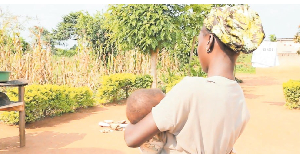By Ghana News
Copyright ghanamma

The government has raised concerns over the rising number of young girls giving birth before reaching the childbearing age.
Mr Aggrey Kiyingi Kabenge, the permanent secretary of the Ministry of Gender, Labour and Social Development, said the issue has been escalating since the Covid-19 lockdown, and it has now reached a level that requires urgent national attention.
“We cannot ignore it; the problem is real. We are working with the UN system on the UN joint program for adolescents and youth,” Mr Kabenge said.
“We are engaging faith-based institutions and cultural leaders to amplify the message, and the First Lady is also leading a campaign against early marriages,” he added.
Mr Kabenge cited several drivers of the surge in teenage pregnancies, including high poverty rates, early sexual activity among children, the erosion of moral values, and the breakdown of family structures.
Last week, Ms Rita Tweheyo, the head of grants at Marie Stopes Uganda, told journalists in Kampala that as the leading reproductive health service provider in the country, they are seeing a growing number of child-headed families across the kingdoms of Tooro, Busoga, and Rwenzururu, as well as in Acholi, Lango, West Nile, and refugee-hosting communities. She warned that if the government does not act swiftly, the social, cultural, and economic consequences of rising teenage pregnancies will soon be felt nationwide.
Ms Tweheyo cited district Health Indicator Surveys, demographic surveys, census results, and performance monitoring action surveys showing that 78 percent of children under 19 years who are in school have had their first sexual experience.
According to her, school-going children are the most affected because they have limited access to contraceptives compared to their peers who are out of school. She also identified poverty, cultural expectations placed on girls, lack of awareness of family planning methods, and limited access to reproductive health services as key contributors to the trend.
“Busoga, followed by Acholi and Lango, are among the regions most affected, and urgent action is needed to curb this growing crisis,” she added.



